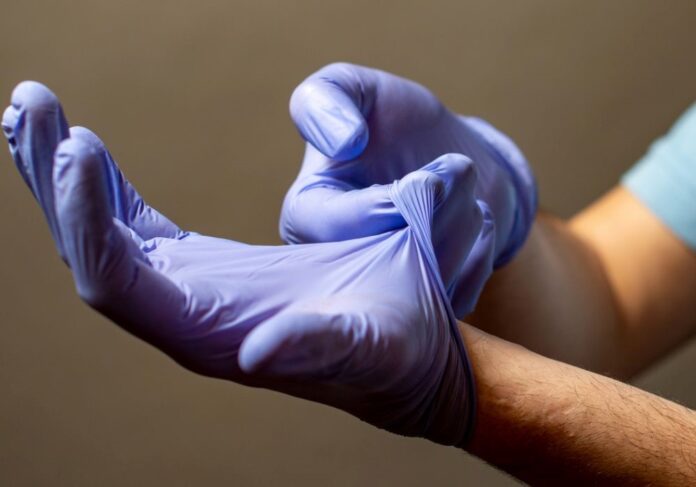Proper sanitation in medical offices and clinics plays a prominent role in maintaining a healthy, safe, and successful healthcare service. Many practices, such as the use of personal protective equipment (PPE) like gloves, can maximize workplace hygiene.
From rotating outside visitors to the various threats of a medical environment—diseases, chemicals, radioactive waste—PPE is important to maintain a clinic’s safety. Gloves protect medical staff from hazard exposure and prevent the spread of illness.
However, latex gloves—the most popular glove in the medical field—come with their own dangers. Here are three alternatives to latex gloves and the importance of providing your healthcare team with various PPE options.
The Dangers of Latex Allergies
Latex allergies are among the most common workplace hazards in dentistry and other healthcare services. It causes a range of reactions, from irritable rashes to anaphylaxis.
On top of health issues and life-threatening scenarios, latex allergies also affect performance and productivity.
High performance and productivity hindrances lead to possible life-and-death situations for medical professionals. Minimizing risks of latex allergic reactions in your healthcare clinic maximizes the safety and success of your business.
Powder-Free Vinyl
Vinyl gloves are synthetic alternatives to latex. They feature a petroleum-based film of polyethylene terephthalate (PET) and polyvinyl chloride (PVC), making the gloves affordable and easy to make.
Vinyl gloves are less durable than latex. They are more suitable for short-term and light-duty examinations that stay on the surface level.
Most vinyl gloves come powdered for easier application and removal and added comfort between the skin and non-slick vinyl material.
Cornstarch and other common glove powders, however, come with high risks of irritation. If you use vinyl gloves in the office for basic check-ups and light-duty tasks, opt for powder-free variations.
Heavy-Duty Neoprene
Many workers in industrial spaces use neoprene gloves when handling higher-risk tasks. They are heavy-duty with high resistance to punctures, chemicals, and abrasive surfaces. They protect you from a range of solvents and oils, making them great for surgical procedures.
Their water-resistant fabrication also makes these gloves suitable for dental work, where a lot of water and liquids are involved. They consist of a synthetic rubber material, eliminating the potential of a latex allergic reaction. With its various functions and high durability, neoprene comes at a higher price than latex alternatives.
Multipurpose Nitrile
Nitrile is the best latex alternative for medical purposes. Like neoprene, nitrile gloves feature high puncture, abrasion, and chemical resistance. They come at an affordable price and are easier to obtain.
They derive from a fortified synthetic rubber called butadiene, making them durable, hypoallergenic, and suitable for various medical tasks.
Whether you are handling hazardous waste—urination samples or discarded body parts—or chemicals, nitrile gloves protect you from burns, germs, and more. On top of protecting you from harm, they don’t skimp on hypoallergenic features.
Supplying your healthcare businesses and professionals with latex glove alternatives minimizes health and safety risks in your clinic.
It ensures your experts stay protected from exposures, work in ideal conditions, and get the job done with ease and minor mishaps. Enhance your healthcare business with the best equipment in your field, like durable, latex-free gloves.
Read Also
- Essential Steps to Launch Your Own Optometry PracticeLaunching your own optometry practice can be a thrilling and fulfilling journey. However, it requires careful planning, dedication, and an understanding of what it takes to succeed. With the growth in demand for eye care, more and more individuals are seeking to start their own practices. But how do you get there? This guide walks… Read more: Essential Steps to Launch Your Own Optometry Practice
- Compounding Pharmacy: Personalized Medication SolutionsA compounding pharmacy plays a vital role in modern healthcare by providing customized medications tailored to the specific needs of individual patients. Unlike mass-produced drugs manufactured by pharmaceutical companies, compounded medications are prepared by licensed pharmacists who carefully combine, adjust, or modify ingredients to create a formulation that best suits a patient’s unique medical requirements.… Read more: Compounding Pharmacy: Personalized Medication Solutions
- The Best Business Decision a Surgeon Ever Made: Ordering a Medical Equipment AppraisalMost surgeons don’t go into medicine because they love spreadsheets, valuations, or negotiating buy-ins. They go into medicine because they want to operate, treat patients, and build something meaningful over time. For one surgeon, that mindset worked perfectly, until the day another surgeon decided to buy into his practice. That moment exposed a problem he… Read more: The Best Business Decision a Surgeon Ever Made: Ordering a Medical Equipment Appraisal
- Creative Approaches to Alleviating Healthcare Staff ShortagesHospitals and clinics are facing staff shortages, which makes it harder to take care of patients well. Finding simple and useful solutions is very important. Easy changes like flexible work hours, good training, and chances to grow can help staff stay happy. Technology, like online doctor visits and helpful tools, can make work easier. Smart… Read more: Creative Approaches to Alleviating Healthcare Staff Shortages
- Understanding the Role of Sterilizers in Healthcare FacilitiesHave you ever wondered how hospitals keep their equipment safe enough to use on dozens of patients every day? Most people never think about what happens behind the scenes, yet these hidden steps play a huge role in patient safety. Sterilizers are part of that system, working quietly to remove harmful germs before any instrument… Read more: Understanding the Role of Sterilizers in Healthcare Facilities






